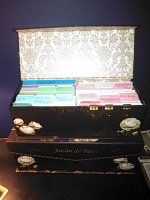Same Boat
Hi there! And welcome to AT!

I was (am?) in the same boat as you. I'm still going through the cards, getting down and committing to memory the basic meanings upon which I can build a strong foundation (and eventually house... of CARDS!) for my studies of the Tarot.
Like you, I kind of hit a block when it came to journalling.
I was never very good at writing about my feelings or experiences in a non-analytical way. When I was just starting out (again), all the sources I read strongly recommended keeping a Tarot Journal. The ones I looked up online were beautiful. Many people had lovely handwriting, colourful inks in which they wrote; some people drew their own illustrations or pasted cards (or copies of cards) inside. I wanted to have something like that, too. But for me, I realized it was just impractical.
I went for a different approach. I strongly connected to the Meanings Guides they have here on AT, and I wanted them for my own. So I bought some sturdy notebooks from the ¥100 Shop (it's like a Dollar Store) and printed out the cards, starting with the Major Arcana. I taped the Fool to the first page and wrote in red ink the part of the Fool's Journey that explains his card. Then I wrote out in black ink the meanings and extra notes for the Fool, adding some of my own thoughts, and leaving room to later write in the Reversal meaning. Then I went on to the Magician. And so on and so forth.
Rather than a tear-inducingly beautiful Tarot Journal, I made Guide to the Tarot that would be useful for *me.* Writing out information not only forces you to read and think about what you're writing, but it also requires an entire physical process: read with your eyes --> think with your brain --> write with your hand. The knowledge, then, isn't just something you store in your head. In writing it out, you've made it a part of your body. And if you've gone about it in a systematic way, the thoughts and information you've made a part of you will be easier to recall because there was some sort of structure to it, and you can now latch onto or climb that structure as you please.
Plus, you get to keep the results! Even though I'm now (in my opinion) intimately familiar with the Major Arcana (at least in the RWS system), I will flip through my Guide to recall some of the more subtle meanings, or the meanings that didn't take as strong a hold in my subconscious.
I'm now doing the same thing with the Minor Arcana, writing the general numerological meanings in red ink and the individual card meanings in black. And when I finish that, I'm going to restart the process for the Tarot de Marseilles (TdM) system.
I also have a Guide for Spreads that I like, and I'll sometimes record my workings with the spreads in that. (But only the date, the question, and the cards in the positions; that way, I can continually reinterpret the reading and not limit myself to my first reading. Sometimes, you can figure out what something means after you've had a long time to think about it, or you realize what something meant much later.)
Ultimately, I'm much more satisfied with my system of making "Guides" rather than "Journals" because I'm just looking for the knowledge right now. The Guides are not fussy in their construction, so I probably wouldn't mind if I spilled coffee on them (though I try not to and haven't so far). And the notebooks won't come apart easily, so I don't mind taking with me for fear of pages coming loose.
And the best thing, for me, is that I can write in them when I have the time. If I have term papers to write and need to focus on those for one or two weeks or if I'm just a tired wreck after work, I can suspend my work on the Guides; they'll be there when I'm ready to come back to them. I can pick up right where I left off precisely because I'm going about it systematically.
For your Prisma Visions journal, I would suggest a similar approach. Go through the deck card-by-card in order and write out its meanings (whether those come from a companion book [if one is available, or if there are online resources regarding the deck] or from your intuition is up to you). BUT! Don't let the creation of the journal/guide stop you from doing daily draws or readings. You don't need to write down every spread or draw in the journal/guide (perhaps keep a separate notebook for that). Instead, focus on interacting with your deck AS you write out your journal/guide. As you create your Guide, the meanings will fall into place and become all the more natural because you've essentially been working on the learning process at two levels simultaneously: on an analytical/systematic level (writing out meanings) and on an intuitive level (working with your deck).
Anyways, I've rambled on long enough, and I'm sure most of what I've said isn't useful, but I do hope it helps you find a middle path between knowledge acquisition, intuition training, and ritualization that works for you.
Cheers!
~ Hatter



